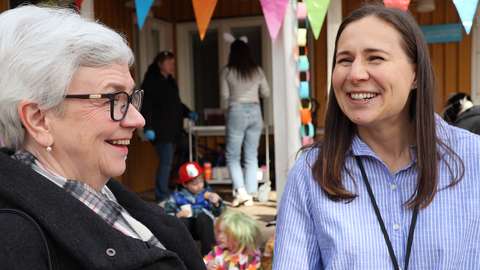It all starts with how we treat each other

In the City of Espoo, each individual is an important part of a functioning whole. Everyone should feel that they are seen and heard.
“What part do you play in the City of Espoo?” is a question that Barbro Högström, Director of Swedish Education and Cultural Services, has asked employees when she conducts performance appraisals.
The question may initially cause confusion, but the outcome is that the employee leaves the meeting feeling that what they do makes a difference. Everyone has a responsibility to influence what they do and how they feel at work. This is how we can create a safe adult world that supports children. At the same time, we create a community where we all support one another.
“We do this for the children and young people. They are a precious resource and we don’t want to lose a single child,” says Högström.
The schools and day care centres in Espoo aim to be establishments that everyone wants to attend. This means that basic values such as joy, respect and a sense of community and meaningfulness should be an intrinsic part of daily life, every day.
This applies to children, parents and staff, including temporary staff, kitchen staff and cleaners. Every director has regular meetings with their employees and encourages them to set concrete goals for their work in order to increase wellbeing at both an individual and group level. These goals are also followed up and evaluated, ensuring that the fine words are backed up by action.
Welcome everyone first thing in the morning
At weekly staff meetings, the focus is on identifying strengths.
“It is important to talk about and highlight things that have gone well during the past week, to make sure that everyone feels seen,” says Marietta Pöntinen, director of Karamalmens daghem.
It is important to develop competence.
“In a learning organisation, we also need to learn with and from each other. For example, one of us might present their thesis or something else that the rest of us can learn from,” says Högström.
On a practical level, the focus is on highlighting small, active choices.
“It’s important to acknowledge every child and parent first thing in the morning,” says Pöntinen.
This means that everyone can come to a day care centre, spend time together and enjoy each other’s company. There are currently some older children and young people who do not want to go to school. To support them, it is important to maintain a constructive dialogue between home and school. If cooperation is to be successful, there needs to be mutual respect for each other and each other’s work.
“The main thing is that everyone feels that we are here now and have time to do things together,” says Högström.
It is about prioritising correctly and really being present where you choose to be. In concrete terms, this might mean that adults put down their mobile phones and are truly present, listening and talking to the children and showing an interest in what they are saying.
“That way, the children and young people know that we care about them. It’s all about awareness. What we take an interest in becomes a reality,” says Högström.
Text: Nora Gullmets
This article has originally been published in the Espoo Magazine 2/2024. Read other articles in the Espoo Magazine.